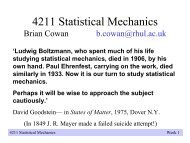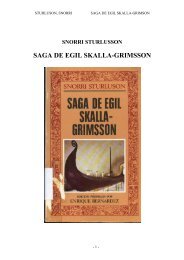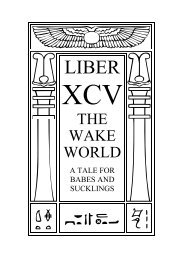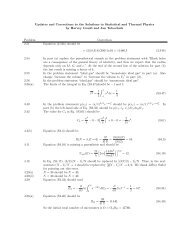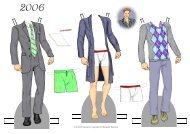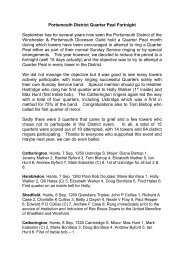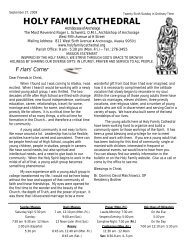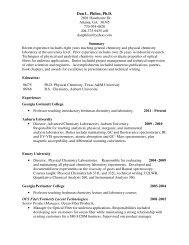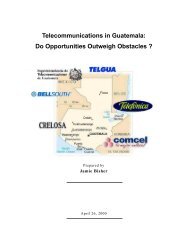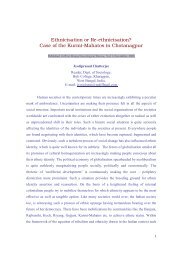Essays on Suicide and the Immortality of the Soul: - WebRing
Essays on Suicide and the Immortality of the Soul: - WebRing
Essays on Suicide and the Immortality of the Soul: - WebRing
Create successful ePaper yourself
Turn your PDF publications into a flip-book with our unique Google optimized e-Paper software.
ESSAYS ON SUICIDE AND THE IMMORTALITY OF THE SOUL<br />
(2) CLEOMENES, king <strong>of</strong> Sparta, when suffering under misfortune, was advised to kill<br />
himself by Tharyce<strong>on</strong>. "Thinkest thou, wicked man, (said he) to shew thy fortitude by<br />
rushing up<strong>on</strong> death, an expedient always at h<strong>and</strong>, <strong>the</strong> dastardly resource <strong>of</strong> <strong>the</strong> {43} basest<br />
minds? Better than we, by <strong>the</strong> fortune <strong>of</strong> arms, or overpowered by numbers, have left <strong>the</strong><br />
field <strong>of</strong> battle to <strong>the</strong>ir enemies; but he who, to avoid pain, or calamity, or censures <strong>of</strong> men,<br />
gives up <strong>the</strong> c<strong>on</strong>test, we are to seek death, that death ought to be in acti<strong>on</strong>. It is base to live or<br />
die <strong>on</strong>ly for ourselves. All we gain by suicide is to get our own reputati<strong>on</strong>, or doing <strong>the</strong> least<br />
service to our country. In hopes, <strong>the</strong>n, we may yet be <strong>of</strong> some use to o<strong>the</strong>rs, both methinks<br />
are bound to preserve life as l<strong>on</strong>g as we can. Whenever <strong>the</strong>se hopes shall have altoge<strong>the</strong>r<br />
ab<strong>and</strong><strong>on</strong>ed us, death, if sought for, will readily be found.<br />
(3) OF all <strong>the</strong> refines cobwebs, to which sophistry has given birth, this seems at <strong>on</strong>ce <strong>the</strong><br />
most elaborate <strong>and</strong> <strong>the</strong> most flimsy. It seems <strong>on</strong>e <strong>of</strong> <strong>the</strong> first <strong>and</strong> most indisputable maxims<br />
in all found reas<strong>on</strong>ing, that no ideas whateve r should have a place in <strong>the</strong> premises, which do<br />
not communicate a sensible energy to <strong>the</strong> c<strong>on</strong>clusi<strong>on</strong>. But where is <strong>the</strong> c<strong>on</strong>necti<strong>on</strong> between<br />
<strong>the</strong> beginning <strong>and</strong> end <strong>of</strong> this wire-drawn argument. What have <strong>the</strong> various beautiful facts,<br />
thus elegantly stated, to do with a man's taking away his own {44} life? Though <strong>the</strong> greatest<br />
philosopher be <strong>of</strong> no more c<strong>on</strong>sequence to <strong>the</strong> general system <strong>of</strong> things than an oyster, <strong>and</strong><br />
though <strong>the</strong> life <strong>of</strong> <strong>the</strong> <strong>on</strong>e were, in every respect, as perfectly insignificant as that <strong>of</strong> <strong>the</strong><br />
o<strong>the</strong>r, still <strong>the</strong> meanest <strong>of</strong> mankind is not without importance in his own eyes. And where is<br />
he who is guided uniformly, in all his acti<strong>on</strong>s, more by a sense <strong>of</strong> his relati<strong>on</strong> to <strong>the</strong> universe<br />
at large, than by <strong>the</strong> value he retains for himself, or <strong>the</strong> deference he has to his own opini<strong>on</strong>.<br />
NO deducti<strong>on</strong>, however plausible, can produce c<strong>on</strong>victi<strong>on</strong> in any rati<strong>on</strong>al mind, which<br />
originates in a suppositi<strong>on</strong> grossly absurd. Is it possible to c<strong>on</strong>ceive <strong>the</strong> author <strong>of</strong> nature<br />
capable <strong>of</strong> au<strong>the</strong>nticating a deed, which ultimately terminates in <strong>the</strong> total annihilati<strong>on</strong> <strong>of</strong> <strong>the</strong><br />
system? By which <strong>of</strong> <strong>the</strong> creatures beneath us is <strong>the</strong> first law <strong>of</strong> <strong>the</strong>ir being thus daringly<br />
violated? And if suicide be eligible to man, under any possible misfortune or distress, why<br />
not to <strong>the</strong>m? Are not <strong>the</strong>y also subject to <strong>the</strong> various miseries which arise from wayward<br />
accidents <strong>and</strong> hostile elements? Why, <strong>the</strong>refore, open a door for our escape from those evils<br />
<strong>of</strong> which o<strong>the</strong>rs have <strong>the</strong>ir share, to whom, however, it must remain for ever shut? {45}<br />
IN truth, <strong>the</strong> existence <strong>of</strong> all animals depends entirely <strong>on</strong> <strong>the</strong>ir inviolable attachment to selfpreservati<strong>on</strong>.<br />
Their attenti<strong>on</strong> to all is accordingly <strong>the</strong> obvious <strong>and</strong> comm<strong>on</strong> c<strong>on</strong>diti<strong>on</strong> <strong>of</strong> all<br />
<strong>the</strong>ir natures. By this great <strong>and</strong> operative principle nature has chiefly c<strong>on</strong>sulted her own<br />
safety. Our philosopher's noti<strong>on</strong>s are so extremely hostile to her most essential instituti<strong>on</strong>s,<br />
that she could not possibly survive a general c<strong>on</strong>victi<strong>on</strong> <strong>of</strong> <strong>the</strong>m. And, in spite <strong>of</strong> all <strong>the</strong><br />
sophistry he is master <strong>of</strong>, <strong>the</strong> questi<strong>on</strong> here will eternally recur, whe<strong>the</strong>r <strong>the</strong> wisdom <strong>of</strong><br />
nature, or <strong>the</strong> philosophy <strong>of</strong> our author, deserves <strong>the</strong> preference.<br />
(4) THIS apology for <strong>the</strong> commissi<strong>on</strong>, arising from man's insignificance in <strong>the</strong> moral world,<br />
from <strong>the</strong> reciprocati<strong>on</strong> <strong>of</strong> social duty being dissolved, or from <strong>the</strong> benefit resulting from <strong>the</strong><br />
voluntary dismissi<strong>on</strong> <strong>of</strong> being, is c<strong>on</strong>trary to <strong>the</strong> soundest principles <strong>of</strong> jurisprudence, to <strong>the</strong><br />
c<strong>on</strong>diti<strong>on</strong> <strong>of</strong> human nature, <strong>and</strong> to <strong>the</strong> general establishment <strong>of</strong> things.<br />
THAT a man who retires from life ad libitum, does no harm to society, is a propositi<strong>on</strong><br />
peculiarly absurd <strong>and</strong> err<strong>on</strong>eous. What is {46} lawful for <strong>on</strong>e, may be lawful for all, <strong>and</strong> no<br />
society can subsist in <strong>the</strong> c<strong>on</strong>victi<strong>on</strong> <strong>of</strong> a principle thus hostile to its being.<br />
IT seems to be a maxim in human existence, that no creature has a right to decide<br />
peremptorily <strong>on</strong> <strong>the</strong> importance, utility, or necessity <strong>of</strong> his own being. There are an infinite<br />
variety <strong>of</strong> secret c<strong>on</strong>necti<strong>on</strong>s <strong>and</strong> associati<strong>on</strong>s in <strong>the</strong> vast system <strong>of</strong> things, which <strong>the</strong> eye <strong>of</strong><br />
created wisdom cannot explore.<br />
MAN is not, perhaps, so ignorant <strong>of</strong> anything, or any creature, as <strong>of</strong> himself. His own<br />
system, after all <strong>the</strong> art <strong>and</strong> inquisiti<strong>on</strong> <strong>of</strong> human ingenuity, is still to him <strong>the</strong> pr<strong>of</strong>oundest<br />
mystery in nature. His knowledge <strong>and</strong> faculties are adequate to <strong>the</strong> sphere <strong>of</strong> his duty.<br />
Bey<strong>on</strong>d this, his researches are impertinent, <strong>and</strong> all his acquisiti<strong>on</strong>s useless. He has no<br />
adequate noti<strong>on</strong>s what <strong>the</strong> laws <strong>of</strong> <strong>the</strong> universe are with respect to any species <strong>of</strong> existence<br />
whatever. A cloud rests <strong>on</strong> <strong>the</strong> complicated movements <strong>of</strong> this great machine, which baffles<br />
all <strong>the</strong> penetrati<strong>on</strong> <strong>of</strong> mortals: <strong>and</strong> it will for ever remain impossible for man, from <strong>the</strong> most<br />
complete analysis <strong>of</strong> his present situati<strong>on</strong>, to judge, with any degree <strong>of</strong> precisi<strong>on</strong>, <strong>of</strong> his own<br />
Get any book for free <strong>on</strong>: www.Abika.com<br />
12



